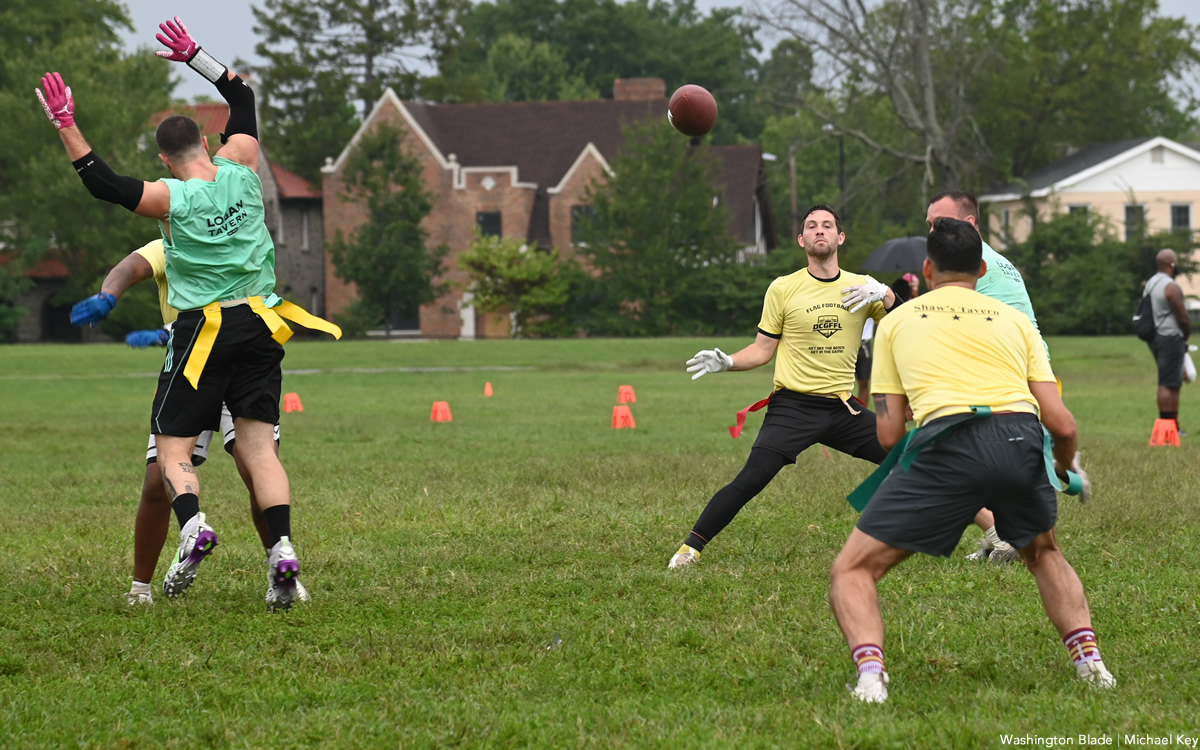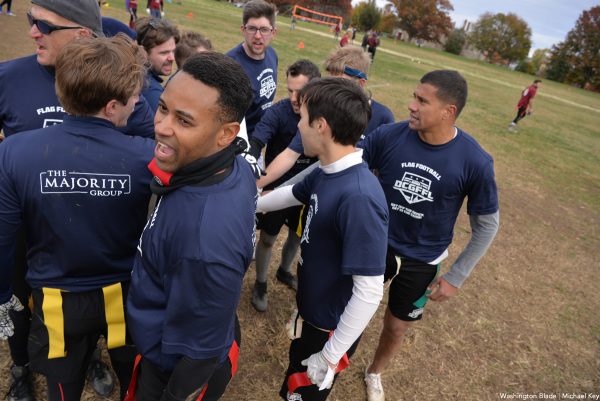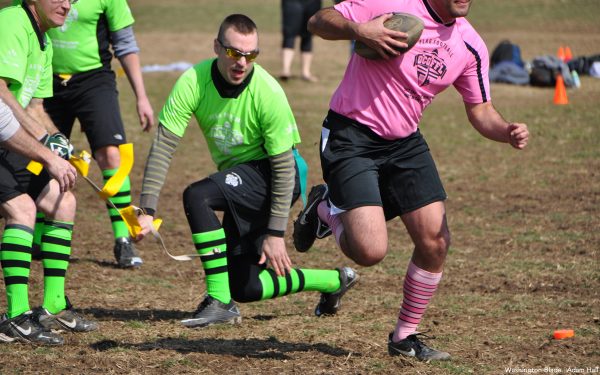Sports
Celebrating sports history: DC Gay Flag Football’s 25th season
Head of District’s premier league says it’s ‘groovin’ to its silver anniversary

What started when gay football fans got together in the 1990s to play their favorite sport is now a D.C. institution with 270 players in 20 teams spread over three fields, playing in both fall and spring.
“Get off the bench,” shouts the slogan on the league’s website. “Get in the game!”
The D.C. Gay Flag Football League turns 25 years old this month and is considered not only the premier league of its kind in the District, but is recognized across the country for its players, organization, and spirit.
“The way we run our league and the way we compete make us stand out relative to the rest,” DCGFFL Commissioner Logan Dawson told the Washington Blade.
For those who don’t know flag football from any other kind, the difference is easy to spot: There’s no contact allowed. As the rules say, “That includes tackling, diving, blocking, and screening. Instead, players wear flags that hang along their sides by a belt. To ‘tackle’ the person in possession of the ball, the opposing team needs to pull one or both of their flags off.” There are a lot more rules, but that’s the one that really sets it apart from tackle football.
The sport itself dates back to World War II and its origins have been traced to Fort Meade, Md.
What’s the secret to the league’s longevity? “I think we attract and hold on to great athletes who are highly competitive, not only on the field, but also, in our professional and personal lives,” he said. Dawson, 32, plays flag football as well as manages the league. He’s currently single, but says his first love is the weather.
“I knew in second grade that I wanted to be a meteorologist,” said Dawson, who moved to the District to be a meteorologist with the National Weather Service.
A prolific swimmer since high school, he came out as he started grad school at Purdue University in Indiana in 2012. In an op-ed appearing in Outsports in 2014, Dawson wrote about competing in his first Gay Games in Cleveland along with a group of other gay swimmers from Colorado, and left that experience determined to join a gay sports league.
He found it in the fall of 2018 in the DCGFFL, the same year the league’s Generals team won Gay Games XVIII. The league supports up to five travel teams, which take part in annual tournaments nationwide. It also hosts a summer tournament each year in Rehoboth Beach, Del.
“There’s a good amount of participation by people who played in the league from the very early days,” Dawson said. “I think we’re just in the sweet spot, where we have a lot of the original participants, a lot of new players, and we’re just kind of grooving right now.”
The first group gathered at Francis Field near Dupont Circle in 1994. Three years later, another group formed to play just steps from the Washington Monument Mall. They came together in 1998 to form what is now the DCGFFL.
“For the majority of those seasons, we mainly had one division that played that was co-ed,” said Dawson. “This is our second season that we’ve had a Womens+ Division made up of [cisgender] women, trans and nonbinary individuals.” The Womens+ teams are called the Senators.
Jayme Fuglesten is director of the Womens+ Division and has played in the league in most seasons since 2011.
“The DCGFFL has been a major part of my adult life,” she says. “I came out while playing in the league in no small part because of the love and support of this community.”
Why does she think the league has been such a success to have lasted 25 years?
“I think the league has been so successful because of its focus on inclusion and community,” she says. “I remember being so surprised in my early years when JJ and so many others would just come right up to me, hug me, and welcome me. And that really hasn’t changed in the 20+ seasons I’ve been around. It also continues to grow and respond to the needs and desires of our players. One example of that is the new Womens+ division, which gives an additional space for people who identify as womens+ to play and cultivate stronger relationships.”

Next month, the DCGFF will send both Generals and Senators to Gay Bowl XXIII in Seattle. “That’s going to be the first time we’re going to have two Womens+ teams at the Gay Bowl,” Dawson told the Blade. “It’s reflective of the new generation of the league.”
Earlier generations had trouble attracting new players. As the Blade reported in 2019, what had been a steady number of 20 to 22 teams dropped dramatically to 14, its lowest roster since 2011. The league’s leadership turned it around with new recruiting events, new sponsors, changes in their social event locations, changes to their player draft and a change of venue for league play beyond Carter Barron fields in Rock Creek Park in Northwest Washington.
Brentwood Hamilton Park in Northeast Washington is now home to the recreation division and Randall Field south of the Capitol is the league’s third venue.
Just like every facet of society, from coast to coast, what happened next hit the league hard. “COVID happened in spring of 2020,” recalled Dawson. “Everything shut down, and we did not play for what amounted to three full seasons for a year and a half.”
But once the world emerged from quarantine and lockdowns, flag football players started flocking to the DCGFFL. “We’ve had probably over 150 new players join our league in the last two years,” he said.
One thing is certain, said Dawson: Despite the name, not everyone who plays in the gay flag football league is LGBTQ+.
“It’s a really great community. There’s a straight couple that’s married and will be soon having a child in the next month or so,” Dawson said. “They met playing in the league, just like we’ve had gay couples who meet in the league and eventually get married and have children.”
Prominent among the league’s many sponsors is the NFL hometown team, the Washington Commanders. “They are highly supportive of us, not just financially, but also publicly supporting what we are, and our mission,” Dawson said.
This current NFL season is the first since 2021 without an out gay player on the gridiron. That’s when Carl Nassib became the first active pro football player to come out as gay.

While Dawson said, “I’m sure there are more out there” who have not yet come out, Nassib’s retirement makes this anniversary of the DCGFFL even more significant.
“It’s unfortunate people still feel they cannot be out while they’re playing and doing what they love, but that’s the reason why something like the D.C. Gay Flag Football League is so important,” he said. “To show that there are gay and trans athletes who exist and love playing sports.”
The league plans to celebrate its 25th anniversary with a dance party and silent auction at Penn Social on Saturday, Sept. 23 starting at 8 p.m. Check the website for ticket information.
Sports
US wins Olympic gold medal in women’s hockey
Team captain Hilary Knight proposed to girlfriend on Wednesday

The U.S. women’s hockey team on Thursday won a gold medal at the Milan Cortina Winter Olympics.
Team USA defeated Canada 2-1 in overtime. The game took place a day after Team USA captain Hilary Knight proposed to her girlfriend, Brittany Bowe, an Olympic speed skater.
Cayla Barnes and Alex Carpenter — Knight’s teammates — are also LGBTQ. They are among the more than 40 openly LGBTQ athletes who are competing in the games.
The Olympics will end on Sunday.
Sports
Attitude! French ice dancers nail ‘Vogue’ routine
Cizeron and Fournier Beaudry strike a pose in memorable Olympics performance

Madonna’s presence is being felt at the Olympic Games in Italy.
Guillaume Cizeron and his rhythm ice dancing partner Laurence Fournier Beaudry of France performed a flawless skate to Madonna’s “Vogue” and “Rescue Me” on Monday.
The duo scored an impressive 90.18 for their effort, the best score of the night.
“We’ve been working hard the whole season to get over 90, so it was nice to see the score on the screen,” Fournier Beaudry told Olympics.com. “But first of all, just coming out off the ice, we were very happy about what we delivered and the pleasure we had out there. With the energy of the crowd, it was really amazing.”
Watch the routine on YouTube here.
Italy
Olympics Pride House ‘really important for the community’
Italy lags behind other European countries in terms of LGBTQ rights

The four Italian advocacy groups behind the Milan Cortina Winter Olympics’ Pride House hope to use the games to highlight the lack of LGBTQ rights in their country.
Arcigay, CIG Arcigay Milano, Milano Pride, and Pride Sport Milano organized the Pride House that is located in Milan’s MEET Digital Culture Center. The Washington Blade on Feb. 5 interviewed Pride House Project Manager Joseph Naklé.
Naklé in 2020 founded Peacox Basket Milano, Italy’s only LGBTQ basketball team. He also carried the Olympic torch through Milan shortly before he spoke with the Blade. (“Heated Rivalry” stars Hudson Williams and Connor Storrie last month participated in the torch relay in Feltre, a town in Italy’s Veneto region.)
Naklé said the promotion of LGBTQ rights in Italy is “actually our main objective.”
ILGA-Europe in its Rainbow Map 2025 notes same-sex couples lack full marriage rights in Italy, and the country’s hate crimes law does not include sexual orientation or gender identity. Italy does ban discrimination based on sexual orientation in employment, but the country’s nondiscrimination laws do not include gender identity.
ILGA-Europe has made the following recommendations “in order to improve the legal and policy situation of LGBTI people in Italy.”
• Marriage equality for same-sex couples
• Depathologization of trans identities
• Automatic co-parent recognition available for all couples
“We are not really known to be the most openly LGBT-friendly country,” Naklé told the Blade. “That’s why it (Pride House) was really important for the community.”
“We want to use the Olympic games — because there is a big media attention — and we want to use this media attention to raise the voice,” he added.

Naklé noted Pride House will host “talks and roundtables every night” during the games that will focus on a variety of topics that include transgender and nonbinary people in sports and AI. Another will focus on what Naklé described to the Blade as “the importance of political movements now to fight for our rights, especially in places such as Italy or the U.S. where we are going backwards, and not forwards.”
Seven LGBTQ Olympians — Italian swimmer Alex Di Giorgio, Canadian ice dancers Paul Poirier and Kaitlyn Weaver, Canadian figure skater Eric Radford, Spanish figure skater Javier Raya, Scottish ice dancer Lewis Gibson, and Irish field hockey and cricket player Nikki Symmons — are scheduled to participate in Pride House’s Out and Proud event on Feb. 14.
Pride House Los Angeles – West Hollywood representatives are expected to speak at Pride House on Feb. 21.
The event will include a screening of Mariano Furlani’s documentary about Pride House and LGBTQ inclusion in sports. The MiX International LGBTQ+ Film and Queer Culture Festival will screen later this year in Milan. Pride House Los Angeles – West Hollywood is also planning to show the film during the 2028 Summer Olympics.
Naklé also noted Pride House has launched an initiative that allows LGBTQ sports teams to partner with teams whose members are either migrants from African and Islamic countries or people with disabilities.
“The objective is to show that sports is the bridge between these communities,” he said.
Bisexual US skier wins gold
Naklé spoke with the Blade a day before the games opened. The Milan Cortina Winter Olympics will close on Feb. 22.
More than 40 openly LGBTQ athletes are competing in the games.
Breezy Johnson, an American alpine skier who identifies as bisexual, on Sunday won a gold medal in the women’s downhill. Amber Glenn, who identifies as bisexual and pansexual, on the same day helped the U.S. win a gold medal in team figure skating.
Glenn said she received threats on social media after she told reporters during a pre-Olympics press conference that LGBTQ Americans are having a “hard time” with the Trump-Vance administration in the White House. The Associated Press notes Glenn wore a Pride pin on her jacket during Sunday’s medal ceremony.
“I was disappointed because I’ve never had so many people wish me harm before, just for being me and speaking about being decent — human rights and decency,” said Glenn, according to the AP. “So that was really disappointing, and I do think it kind of lowered that excitement for this.”
-

 Massachusetts5 days ago
Massachusetts5 days agoEXCLUSIVE: Markey says transgender rights fight is ‘next frontier’
-

 Opinions4 days ago
Opinions4 days agoGay Treasury Secretary’s silence on LGBTQ issues shows he is scum
-

 U.S. Military/Pentagon4 days ago
U.S. Military/Pentagon4 days ago4th Circuit rules against discharged service members with HIV
-

 New York4 days ago
New York4 days agoLawsuit to restore Stonewall Pride flag filed

















